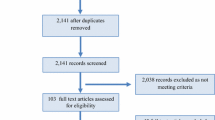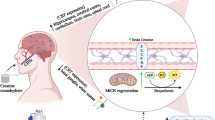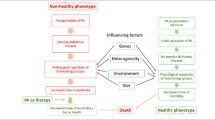Abstract
Purpose of Review
This paper aims to understand in what aspects exercise benefits traumatic brain injury patients. It examines the molecular basis of how exercise may facilitate cognitive recovery, discuss the clinical evidence of the benefits of exercise on cognition and mood impairments in patients, and identify potential barriers for patients recovering from traumatic brain injury from engaging in physical exercise.
Recent Findings
There are extensive reviews exploring the effect of exercise on patients recovering from traumatic brain injury. Exercise appears to have benefit in global cognition and mood. Exercise is a non-pharmacological and non-invasive therapy for improving brain function in patients recovering from traumatic brain injury.
Summary
Exercise should be recommended for patients recovering from acute and chronic brain injury. It is seen to improve global cognition and mood impairments.
Similar content being viewed by others
References
Papers of particular interest, published recently, have been highlighted as: • Of importance •• Of major importance
National Hospital Discharge Survey (NHDS). 2010; National Hospital Ambulatory Medical Care Survey (NHAMCS), 2010; National Vital Statistics System (NVSS). 2010. http://www.cdc.gov/traumaticbraininjury/severe.html. Accessed 30 Mar 2019.
Ruet A, Bayen E, Jourdan C, Ghout I, Meaude L, Lalanne A, et al. A detailed overview of long-term outcomes in severe traumatic brain injury eight years post-injury. Front Neurol. 2019;10:120. https://doi.org/10.3389/fneur.2019.00120.
Grazioli E, Diamaruo I, Mercatelli N, Wang G, Pitsiladis Y, Di Luigi L, et al. Physical activity in the prevention of human disease: role of epigenetic modifications. BMC Genomics. 2017;18(Suppl 8):802. https://doi.org/10.1186/s12864-017-4193-5.
Warburton DER, Bredin SSD. Health benefits of physical activity: a systematic review of current systematic reviews. Curr Opin Cardiol. 2017;32(5):541–56. https://doi.org/10.1097/HCO.0000000000000437.
Reiner M, Niermann C, Jekauc D, Woll A. Long-term health benefits of physical activity--a systematic review of longitudinal studies. BMC Public Health. 2013;13:813. https://doi.org/10.1186/1471-2458-13-813.
Erickson KI, Leckie RL, Weinstein AM. Physical activity, fitness, and gray matter volume. Neurobiol Aging. 2014;(35 Suppl2):S20–8. https://doi.org/10.1016/j.neurobiolaging.2014.03.034.
Vecchio LM, Meng Y, Xhima K, Lipsman N, Hamani C, Aubert I. The neuroprotective effects of exercise: maintaining a healthy brain throughout aging. Brain Plast. 2018;4(1):17–52. https://doi.org/10.3233/BPL-180069.
Saraulli D, Costanzi M, Mastrorilli V, Farioli-Vecchioli S. The long run: neuroprotective effects of physical exercise on adult neurogenesis from youth to old age. Curr Neuropharmacol. 2017;15(4):519–33. https://doi.org/10.2174/1570159X14666160412150223.
Jacotte-Simancas A, Costa-Miserachs D, Coll-Andreu M, Torras-Garcia M, Borlongan CV, Portell-Cortés I. Effects of voluntary physical exercise, citicoline, and combined treatment on object recognition memory, neurogenesis, and neuroprotection after traumatic brain injury in rats. J Neurotrauma. 2015;32(10):739–51. https://doi.org/10.1089/neu.2014.3502.
Harris TC, de Rooij R, Kuhl E. The shrinking brain: cerebral atrophy following traumatic brain injury. Ann Biomed Eng. 2018;47:1941–59. https://doi.org/10.1007/s10439-018-02148-2.
Ross DE. Review of longitudinal studies of MRI brain volumetry in patients with traumatic brain injury. Brain Inj. 2011;25(13–14):1271–8. https://doi.org/10.3109/02699052.2011.624568.
• Cole JH, Jolly A, de Simoni S, Bourke N, Patel MC, Scott G, et al. Spatial patterns of progressive brain volume loss after moderate-severe traumatic brain injury. Brain. 2018;141(3):822–36. https://doi.org/10.1093/brain/awx354This is a longitudinal case-control study of 61 TBI patients and 32 healthy controls to evaluate brain atrophy differences. TBI patients had more progressive brain tissue volume loss than healthy control patients.
Ramanoël S, Hoyau E, Kauffmann L, Renard F, Pichat C, Boudiaf N, et al. Gray matter volume and cognitive performance during Normal aging. A voxel-based morphometry study. Front Aging Neurosci. 2018;10:235. https://doi.org/10.3389/fnagi.2018.00235.
• Håkansson K, Ledreux A, Daffner K, Terjestam Y, Bergman P, Carlsson R, et al. BDNF Responses in healthy older persons to 35 minutes of physical exercise, cognitive training, and mindfulness: associations with working memory function. J Alzheimers Dis. 2017;55(2):645–57. https://doi.org/10.3233/JAC-160593This is a prospective cross over study of 19 adults that demonstrated increase in BDNF levels with exercise. The study also demonstrated an association between serum BDNF response to exercise and working memory.
Stein AM, Silva TMV, Coelho FG, Arantes FJ, Costa JLR, Teodoro E, et al. Physical exercise, IGF-1 and cognition a systematic review of experimental studies in the elderly. Dement Neuropsychol. 2018;12(2):114–22. https://doi.org/10.1590/1980-57642018dn12-020003.
Mattson MP. Lifelong brain health is a lifelong challenge: from evolutionary principles to empirical evidence. Ageing Res Rev. 2015;20:37–45. https://doi.org/10.1016/j.arr.2014.12.011.
Maass A, Düzel S, Brigadski T, Goerke M, Becke A, Sobieray U, et al. Relationships of peripheral IGF-1, VEGF and BDNF levels to exercise-related changes in memory, hippocampal perfusion and volumes in older adults. Neuroimage. 2016;131:142–54. https://doi.org/10.1016/j.neuroimage.2015.10.084.
Dinoff A, Herrmann N, Swardfager W, Liu CS, Sherman C, Chan S, et al. The effect of exercise training on resting concentrations of peripheral brain-derived neurotrophic factor (BDNF): a meta-analysis. PLoS One. 2016;11(9):e0163037. https://doi.org/10.1371/journal.pone.0163037.
•• Vanderbeken I, Kerckhofs E. A systematic review of the effect of physical exercise on cognition in stroke and traumatic brain injury patients. NeuroRehabilitation. 2017;40(1):33–48. https://doi.org/10.3233/NRE-161388This is a systematic review of nine randomized, two non-randomized controlled trials, and three single group pre-post studies evaluating cognition and memory in TBI or stroke in response to exercise. There is a positive effect on global cognitive functioning with physical exercise.
Ramos-Cejudo J, Wisniewski T, Marmar C, Zetterberg H, Blennow K, de Leon MJ, et al. Traumatic brain injury and Alzheimer’s disease: the cerebrovascular link. EBioMedicine. 2018;28:21–30. https://doi.org/10.1016/j.ebiom.2018.01.021.
Paillard T, Rolland Y, de Souto Barreto P. Protective effects of physical exercise in Alzheimer’s disease and Parkinson’s disease: a narrative review. J Clin Neurol. 2015;11(3):212–9. https://doi.org/10.3988/jcn.2015.11.3.212.
van Gelder BM, Tijhuis MA, Kalmijn S, Giampaoli S, Nissinen A, Kromhout D. Physical activity in relation to cognitive decline in elderly men: the FINE study. Neurology. 2004;63:2316–21.
Cammisuli DM, Innocenti A, Fusi J, Franzoni F, Pruneti C. Aerobic exercise effects upon cognition in Alzheimer’s disease: a systematic review of randomized controlled trials. Arch Ital Biol. 2018;156(1–2):54–63. https://doi.org/10.12871/00039829201816.
Gomez-Pinilla F, Hillman C. The influence of exercise on cognitive abilities. Compr Physiol. 2013;3(1):403–28. https://doi.org/10.1002/cphy.c110063.
Rzezak P, Caxa L, Santolia P, Antunes HK, Suriano I, Tufik S, et al. Affective responses after different intensities of exercise in patients with traumatic brain injury. Front Psychol. 2015;6:839. https://doi.org/10.3389/fpsyg.2015.00839.
Weinstein AA, Chin LMK, Collins J, Goel D, Keyser RE, Chan L. Effect of aerobic exercise training on mood in people with traumatic brain injury: a pilot study. J Head Trauma Rehabil. 2017;32(3):E49–56. https://doi.org/10.1097/HTR.0000000000000253.
•• Perry SA, Coetzer R, CWN S. The effectiveness of physical exercise as an intervention to reduce depressive symptoms following traumatic brain injury: a meta analysis and systematic review. Neuropsychol Rehabil. 2018:1–15. https://doi.org/10.1080/09602011.2018.1469417This is a meta-analysis and systematic review of three controlled trials, six uncontrolled trials evaluating physical exercise effect on depressive symptoms in TBI. There is some effect on reducing depressive symptoms with exercise in TBI.
• Wise EK, Hoffman JM, Powell JM, Bombardier CH, Bell KR. Benefits of exercise maintenance after traumatic brain injury. Arch Phys Med Rehabil. 2012;93(8):1319–23. https://doi.org/10.1016/j.apmr.2012.05.009This is a prospective study of 40 patients with self-reported TBI that underwent a ten-week exercise intervention program. Participants had improvement in mood and higher perceived quality of life.
Gordon WA, Sliwinski M, Echo J, McLoughlin M, Sheerer MS, Meili TE. The benefits of exercise in individuals with traumatic brain injury: a retrospective study. J Head Trauma Rehabil. 1998;13(4):58–67.
Kanamori S, Takamiya T, Inoue S, Kai Y, Tsuji T, Kondo K. Frequency and pattern of exercise and depression after two years in older Japanese adults: the JAGES longitudinal study. Sci Rep. 2018;8(1):11224. https://doi.org/10.1038/s41598-018-29053-x.
• Morres ID, Hatzigeorgiadis A, Stathi A, Comoutos N, Arpin-ribbie C, Krommidas C, et al. Aerobic exercise for adult patients with major depressive disorder in mental health services: a systematic review and meta-analysis. Depress Anxiety. 2019;36(1):39–53. https://doi.org/10.1002/da.22842This is a meta-analysis that evaluated aerobic exercise association with antidepressant effects. Aerobic exercise is an effective antidepressant intervention.
Clanchy KM, Tweedy SM, Trost SG. Evaluation of a physical activity intervention for adults with brain impairment: a controlled clinical trial. Neurorehabil Neural Repair. 2016;30(9):854–65. https://doi.org/10.1177/1545968316632059.
Rimmer JH, Wang E, Smith D. Barriers associated with exercise and community access for individuals with stroke. J Rehabil Res Dev. 2008;45(2):315–22.
Author information
Authors and Affiliations
Corresponding author
Ethics declarations
Conflict of Interest
The authors declare that they have no conflicts of interest.
Human and Animal Rights and Informed Consent
This article does not contain any studies with human or animal subjects performed by any of the authors.
Additional information
Publisher’s Note
Springer Nature remains neutral with regard to jurisdictional claims in published maps and institutional affiliations.
This article is part of the Topical Collection on Brain Injury Medicine and Rehabilitation
Rights and permissions
About this article
Cite this article
Lin, C.J., Lercher, K. Exercise Benefits in Patients Recovering from Traumatic Brain Injury. Curr Phys Med Rehabil Rep 7, 357–361 (2019). https://doi.org/10.1007/s40141-019-00249-0
Published:
Issue Date:
DOI: https://doi.org/10.1007/s40141-019-00249-0




